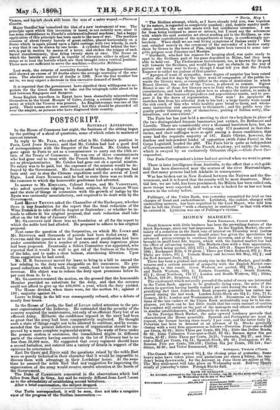POSTSCRIPT.
SATURDAY AFTERNOON.
In the House of Commons last night, the business of the sitting began by the putting of a shoal of questions, some of which relate to matters of current interest.
In reply to Mr. PALE, who asked what is Mr. Cobden's position in Paris, Lord JOHN RUSSELL said that Mr. Cobden had had a good deal of correspondence with the Emperor of the French. Mr. Cobden had gone again to Paris to act as a commissioner to carry out the 13th ar- ticle of the Treaty of Commerce. He was one of three commissioners who had gone out to treat with the French Ministry, but they did not act as plenipotentiaries. Mr. Cobden had gone out on a special mission. No salary was to be paid, but the expenses of the mission would be de- frayed by the Government. Mr. BArLLIE asked whether a telegram had been sent out to stop the Chinese expedition until the arrival of Lord Elgin. Lord JOHN RUSSELL said he had to state there was no truth in the rumours to which the honourable gentleman had adverted.
In answer to Mr. K1NNAIRD, Colonel SYKES, and Mr. VANerrranr, who asked questions relisting to Indian subjects, Sir CHARLES Woos said the state of things in connexion with the growth of indigo by the Ryots was eminently unsatisfactory, and required to be dealt with by the Government.
Lord AENRY THYNNE asked the Chancellor of the Exchequer, whether there is itny foundation for the report that the final reduction of the Wine Dutiecis to take effect in August or September ; or whether he in- tends to adhere to his original proposal, that such reduction shall take effect on the 1st day of January 1861. Mr. GLADSTONE said there was no foundation at all for the report to which the noble lord had alluded. He proposed to adhere to his original propos•al. Next came the question of the Serpentine, on which Mr. LocKE and Mr. BENTINCK said thousands of pounds had been fooled away. Mr. COWPER said the question as to the beat means of purification had been under consideration for a number of years, and many ingenious plans had been proposed. Eventually a Select Committee was appointed, who reported that it would be well to get rid of the foulness at the bottom of the lake, and to make a clear bottom, abandoning filtration. Upon those suggestions he had acted. Mr. H. B. SHERIDAN moved for leave to bring in a bill to amend the law relating to the duty now, chargeable on fire insurances. He pro- posed reductions which would, in the result, tend to increase the public revenue. His object was to reduce the duty upon premiums below 5s. per cent from 38. to Is.
Mr. GLADSTONE resisted the elation, on the ground that;the honourable Member provided no substitute for the duty, and that the revenue could not afford to give up the 430,0001. a year, which the duty yielded.
The House divided, when there were, for the motion. 84 ; against it 108 ; majority. against 24. - Leave to bring in the bill was consequently refused, after a debate of nearly four hours.
In the House of Lords, the Earl of Lucan called attention to the pre- sent organization of the Infantry. He contended that the security of the
country required the maintenance, not only of an efficient Navy but of an efficient Army. Hitherto the confidence reposed in the navy bad been so great that the armihad been comparatively neglected. He thought such a state of things ,ought not to be allowed to continue, and he recom- mended that the present defective system of organization should be' im- proved by a more complete regimental system. The waste of force under the present system is enormous, the, consolidated d"ep"ots in different parts of the country having amounted on the let of February last to no less than 28,000 men. He suggested, that every regiment should have a second battalion, and entered into n Variety of detaila in support of the opinions ho entertained.
Earl Ds Gafit:O.CRiros said the questions raised by the noble Bad were so purely Technical in their character that it would be impossible to
discuss them with advantage their Lordships' house. At tho aa time he assured the noble Earl that any suggestion for improving the organization,ciffthchrw,
, would receive careful attention at the hands of the GovernmenL
The Duke Of •Csitinnion concurred in the observations which had fallen from Earl de Grey, but said he entirely differed,trom Lord Lucan as to the advisability of.establishing second battalions.
After a brief convermnion, the subject dripped.


























 Previous page
Previous page